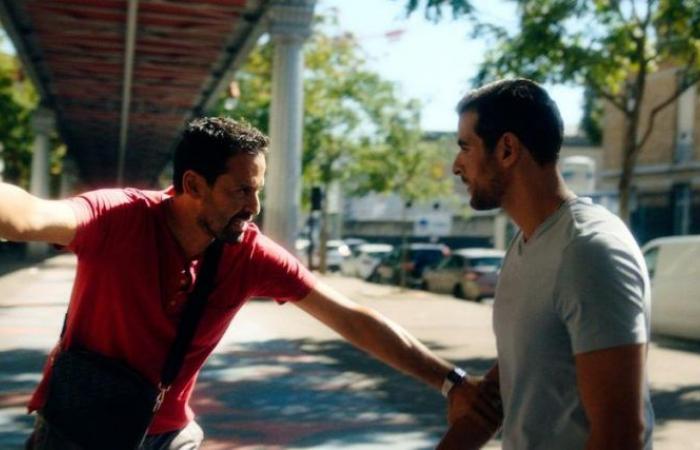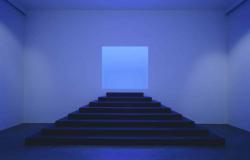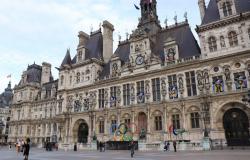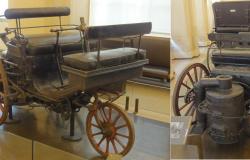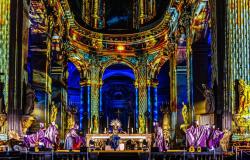A film about Barbès? This is a perilous project. Beware of two pitfalls: the somewhat naive postcard, which would celebrate multiculturalism without seeing the strong tensions working this former suburb in the north of Paris or, conversely, a representation centered on deals and delinquency. Facts certainly visible in broad daylight, but only concern a minority of residents.
With “Barbès, little Algeria”, director Hassan Guerrar creates a feature film that is not only moving, but fair and balanced. His description of Barbès is precise, full of details, the best weapon against generalizations. He imagined the story of Malek, a serious, melancholy young man, who moves to this neighborhood with a nephew he is raising, and who, through contact with local figures, reconnects with his Algerian roots from which he had deliberately separated himself. . We follow his immersion in Barbès, at the same time as his inner journey towards his origins.
Hassan Guerrar this summer at the Angoulême Festival, where the film was presented in preview
Anne Lacaud / SO
This is the first film by Hassan Guerrar, a press officer known in the cinema industry. We spent two hours with him in his stronghold of Barbès. He cannot take a step without being greeted.
How would you introduce yourself?
I am a press officer, producer, and now screenwriter and director. I think this combination is quite rare! I entered the world of cinema forty years ago, at 16 years old. At the time, I could barely read and write. I grew up between Paris and Chlef in Algeria. I was a child left to his own devices. In Paris, I lived for years in a squat near the Gare de Lyon.
Perhaps this is why you understand these lost teenagers that we see in Barbès and in your film?
Having been in their shoes, I know their psychology. I know that the challenge, every moment, is to survive. Every day, the three goals are finding food, water, and a place to sleep. And at the same time, there is an important sense of pride. We hide our fragility and our fear behind exuberance and chatter.
How was “Barbes, little Algeria” born?
It all started during confinement. I spent a lot of time walking around the neighborhood, imagining lots of little stories. One evening, I spoke about it to the director Audrey Diwan, a neighbor, who invited me to her house and said: “Let’s go ahead, let’s write a screenplay with your Barbès stories! » I was the first surprised, and intimidated. Together, we wrote a 14-page synopsis. Then I refined this base by taking advice, particularly on religious aspects, from the writer and academic Rachid Benzine (Islamologist, Editor’s note). A third person was decisive in the writing: the author and filmmaker Peter Dourountzis, very sensitive, precise. It was with him that we arrived at the final version of the scenario.
Was making a film a dream?
No, I had never dreamed of it quite simply because I felt completely incapable of it. Besides, my first steps as a director were epic. I didn’t have a clear idea of all the positions for the shoot. The first day, I warned my team: I don’t know anything about it!
I grew up between Paris and Chlef in Algeria. I was a child left to my own devices”
Malek, is that you?
There’s quite a bit of me. He is a dual national, like me, integrated, like me, and the journey he takes in relation to his family and his origins, I have done too. I am moved by the total involvement in the role of Sofiane Zermani.
How did the filming go?
GOOD ! I called on local residents in many positions. And people know me, they knew that I wasn’t going to fall into the usual clichés, the cameras that come to film pickpocketing or trafficking. I show this violence, the trafficking of cigarettes, drugs, papers, medicines… but also moments of generosity, like the food distributions at Saint-Bernard church. The residents were happy that my main character, Malek, is a normal guy, who has an apartment, a job, educates his nephew… This is the reality of a large majority of the residents of Barbès.
Barbès is really a village: everyone knows everyone”
The characters are often of Algerian origin, is Barbès really Algerian?
Part of Barbès yes, even with different Algerian communities. Another part of Barbès is more “black”. There are also bobo pockets. It is not a homogeneous neighborhood. There are several worlds in Barbès.
It’s crazy, it feels like the whole neighborhood knows you…
Yes, because Barbès is really a village: everyone knows everyone. Here, I feel like I’m in the countryside! They call me “uncle” (laughs).
“Barbes, little Algeria”, by Hassan Guerrar, with Sofiane Zermani, Khalil Gharbia, Khaled Benaissa. Duration: 1 hour 33 minutes. Theatrical release on Wednesday October 16.

